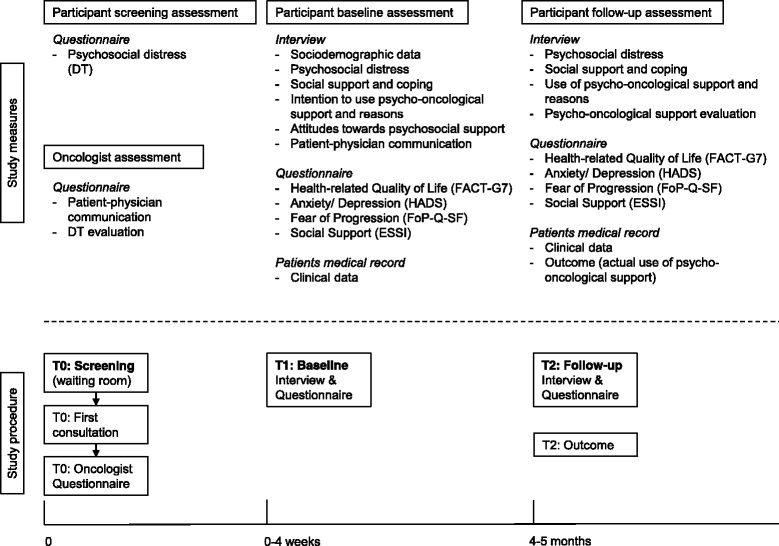Understanding why cancer patients accept or turn down psycho-oncological support: a prospective observational study including patients' and clinicians' perspectives on communication about distress
- PMID: 28558713
- PMCID: PMC5450069
- DOI: 10.1186/s12885-017-3362-x
Understanding why cancer patients accept or turn down psycho-oncological support: a prospective observational study including patients' and clinicians' perspectives on communication about distress
Abstract
Background: International standards prioritize introducing routine emotional distress screening in cancer care to accurately identify patients who most need psycho-oncological treatment, and ensure that patients can access appropriate supportive care. However, only a moderate proportion of distressed patients accepts referrals to or uses psycho-oncological support services. Predictors and barriers to psycho-oncological support service utilization are under-studied. We know little about how patients and oncologists perceive the discussions when oncologists assess psychosocial distress with a screening instrument. We aim to 1) assess the barriers and predictors of uptake of in-house psycho-oncological support along the distress screening pathway in cancer patients treated at a University Oncology Outpatient Clinic and, 2) determine how patients and clinicians perceive communication about psychosocial distress after screening with the Distress Thermometer.
Methods: This is a quantitative prospective observational study with qualitative aspects. We will examine medical and demographic variables, cancer patient self-reports of various psychological measures, and aspects of the patient-clinician communication as variables that potentially predict uptake of psycho-oncological support service. We will also assess the patients' reasons for accepting or refusing psycho-oncological support services. We assess at three points in time, based on paper-and-pencil questionnaires and two patient interviews during the study period. We will monitor outcomes (psycho-oncology service uptake) four months after study entry.
Discussion: The study will improve our understanding of characteristics of patients who accept or refuse psycho-oncological support, and help us understand how patients' and oncologists perceive communication about psychosocial distress, and referral to a psycho-oncologist. We believe this is the first study to focus on factors that affect uptake or rejection of psycho-oncological support services along the screening and referral pathway. The study 1) combines standard assessment with qualitative data collection, 2) embraces patient and oncologist perspectives, and, 3) focuses on patient-clinician communication about psychosocial issues raised by a standard screening instrument. Our results may improve routine practices and eliminate barriers to adequate health care, and make it easier to recognize patients with high distress levels who underuse the service.
Figures
Similar articles
-
Oncologist recommendation matters!-Predictors of psycho-oncological service uptake in oncology outpatients.Psychooncology. 2019 Feb;28(2):351-357. doi: 10.1002/pon.4948. Epub 2018 Dec 12. Psychooncology. 2019. PMID: 30466146
-
[Standardized distress screening programs do not replace discussing distress and psychosocial care needs with patients].Ther Umsch. 2019 Sep;76(4):219-224. doi: 10.1024/0040-5930/a001087. Ther Umsch. 2019. PMID: 31498042 Review. German.
-
Doctor's recommendations for psychosocial care: Frequency and predictors of recommendations and referrals.PLoS One. 2018 Oct 4;13(10):e0205160. doi: 10.1371/journal.pone.0205160. eCollection 2018. PLoS One. 2018. PMID: 30286172 Free PMC article.
-
Effect of a structured psycho-oncological screening and treatment model on mental health in cancer patients (STEPPED CARE): study protocol for a cluster randomized controlled trial.Trials. 2014 Dec 10;15:482. doi: 10.1186/1745-6215-15-482. Trials. 2014. PMID: 25491069 Free PMC article. Clinical Trial.
-
[The significance of psycho-oncology for urology].Aktuelle Urol. 2019 Apr;50(2):166-171. doi: 10.1055/a-0808-1532. Epub 2019 Jan 16. Aktuelle Urol. 2019. PMID: 30650452 Review. German.
Cited by
-
Recruitment problems in psychosocial oncology research.Psychooncology. 2018 Sep;27(9):2296-2298. doi: 10.1002/pon.4792. Epub 2018 Jun 29. Psychooncology. 2018. PMID: 29886576 Free PMC article. No abstract available.
-
Perceived importance of emotional support provided by health care professionals and social networks: Should we broaden our focus for the delivery of supportive care?Asia Pac J Clin Oncol. 2023 Dec;19(6):681-689. doi: 10.1111/ajco.13922. Epub 2023 Jan 25. Asia Pac J Clin Oncol. 2023. PMID: 36698247 Free PMC article.
-
A Web-Based Intervention to Reduce Distress After Prostate Cancer Treatment: Development and Feasibility of the Getting Down to Coping Program in Two Different Clinical Settings.JMIR Cancer. 2018 Apr 30;4(1):e8. doi: 10.2196/cancer.8918. JMIR Cancer. 2018. PMID: 29712628 Free PMC article.
-
'Patients with Cancer are Distressed!' Indian Healthcare Provider Perspectives on Distress Screening and Referrals to Psycho-oncology Services - A Mixed Methods Study.Indian J Palliat Care. 2021 Oct-Dec;27(4):561-570. doi: 10.25259/IJPC_142_21. Epub 2021 Oct 21. Indian J Palliat Care. 2021. PMID: 34898952 Free PMC article.
-
Reported Concerns and Acceptance of Information or Referrals Among Breast Cancer Survivors Seen for Care Planning Visits: Results from the University of Wisconsin Carbone Cancer Center Survivorship Program.J Cancer Educ. 2022 Dec;37(6):1702-1710. doi: 10.1007/s13187-021-02015-0. Epub 2021 Apr 26. J Cancer Educ. 2022. PMID: 33904118 Free PMC article.
References
-
- Dolbeault S, Bredart A, Mignot V, Hardy P, Gauvain-Piquard A, Mandereau L, et al. Screening for psychological distress in two French cancer centers: feasibility and performance of the adapted distress thermometer. Palliat Support Care. 2008;6:107–17. - PubMed
Publication types
MeSH terms
LinkOut - more resources
Full Text Sources
Other Literature Sources
Medical


